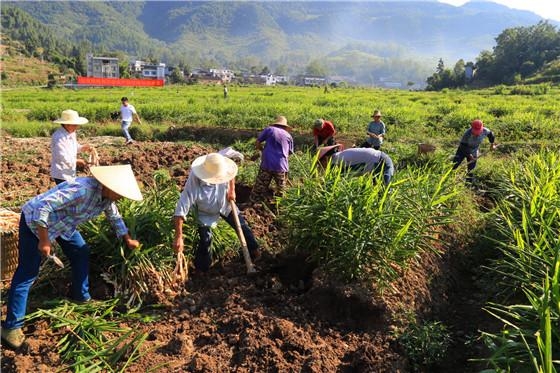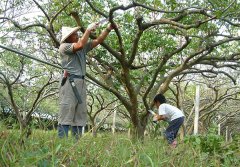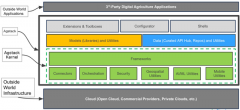New opportunities for epidemic situation to reverse traditional agricultural agricultural e-commerce
With the spread of COVID-19 's epidemic in the community, Taiwan has implemented a three-level alert, schools have been closed, and companies have implemented remote work, which has dealt a heavy blow to the livelihood of small farmers everywhere. People stay at home, a variety of organic agricultural e-commerce platforms provide services at the right time, and their performance grows multiple times; consumers buy directly from farmers, bringing the distance between the place of origin and the dining table closer, which can avoid the exploitation of middlemen.

Since the level 3 alert was put on alert on May 19, schools at all levels have been closed, nutritious lunches have also stopped, and small farmers everywhere who used to supply organic fruits and vegetables in schools have been severely hit. The Council of Agriculture joined 60 agricultural e-commerce platforms to launch the "Agricultural Carnival" online platform. People go online or directly buy fresh fruits and vegetables from farmers through mobile phone App, and the house is distributed to the government. Since the launch of the website, the performance has nearly tripled.
The biggest problem in the production and marketing of agricultural products is that from producing areas to consumers, they have been exploited through layers of checkpoints. Take fruit as an example. After the small farmers on the mountain harvest, they are transported to the foot of the mountain, and then transferred to supermarkets in the north, central and south, and finally reached the hands of consumers. Several hurdles have been passed. Take garlic, onions and red beans as an example. If they are in the hands of a few large-market traders, they can manipulate prices, and farmers become the targets of exploitation.
Affected by the epidemic, local agricultural e-commerce platforms provide fresh, affordable and residential services to the government, which not only shortens the distance from the origin to the dining table, but also avoids the exploitation of the middleman. In the future, this kind of agricultural e-commerce platform will gradually become the mainstream, which will help small farmers get rid of the manipulation and control of prices by large-market merchants.
What small farmers need most is marketing and access. In recent years, universities have launched a social responsibility movement (USR). Apart from being a place for young students to receive education, universities can also be combined with local social organizations to help small farmers and give full play to the social responsibility of universities. For example, Jinan University is close to Riyue Lake and the Nine ethnic Cultural Village, and there are many agricultural and tourist attractions around it. Students have launched plans to train farmers in coffee production and marketing classes in places such as the country's surname, fish ponds, and Puli, and conduct coffee-related activities. raise awareness and help marketing.
The Chengchi University in Muzha, surrounded by many tea gardens, is famous for Tieguanyin and the four Seasons. The 501st Social Enterprise of National Chengchi University was established at the beginning of this year to call on alumni to take action to practice community-supported agriculture (CSA). Small farmers in organic farming who do not use chemical fertilizers and pesticides may have higher costs. therefore, through the strength of the community, small farmers can have orders before sowing and transplanting rice seedlings, so that more farmers can be encouraged to join the ranks of organic farming.
The COVID-19 epidemic has changed various industries and accelerated the digital transformation. If the mode of agricultural transportation and marketing can be digitized generally and a complete production and marketing resume can be established, it will help to enhance the competitiveness of small farmers. Small farmers sell through e-commerce platforms, directly facing consumers and providing them with government houses, while consumers can buy agricultural products with brands and production and marketing experience, which is beneficial to small farmers everywhere.
If a university promotes a social responsibility movement, it can, through the social enterprise platform, combine with its students or graduate alumni to support local small farmers for a long time. If each person buys 1,000 yuan of organic products from local small farmers every month, 50 alumni can support one small farmer. 500 alumni can support 10 small farmers and use food to exert their real influence.
The COVID-19 epidemic has dealt a lot of negative blows to everyone, but it also provides business opportunities for the transformation of many industries.
- Prev

Lin Yilong worked as a farmer for 16 years without medicine, fat and economy.
Lin Yilong's home is located on the hillside of Luye Gaotai, years pacing between the coastal mountains and the central mountains, looking at the dense mountains in the Peinan Creek Valley in the morning, watching the moonlight at night, and letting the stars coax to sleep. Dulan Mountain and Luye Creek are the music of the "four Seasons".
- Next

Linux Foundation launched AgStand, an open source project for agriculture, to realize the intelligence of agricultural information.
The AgStand Foundation will establish and maintain a global food and agriculture data infrastructure to help digitally transform climate change, rural participation and food and water security. May 5th, 2021, Calif. San Francisco Linux Foundation, an open source real
Related
- A one-day flower show brings 130 million yuan in orders! Nanhai, this Phalaenopsis exhibition is amazing
- What do the flower language and meaning of Lutheran tree mean? Precautions for planting Lutheran tree
- Encounter Chaoshan Kongfu tea, not without this cup of Phoenix single clump
- The durian market in Vietnam and Thailand is flooded. The price of imported durian has plummeted by 30-40% in a month.
- Shanghai solved the problem of local vegetable supply by planting 80,000 mu of green leafy vegetables.
- Wageningen University has become the best agricultural university in the world for the seventh time in a row.
- The strongest export season of South African grapes is full of challenges, with exports to Russia falling sharply by 21%.
- Sri Lanka is on the verge of bankruptcy, "Tea for debt" Organic Agriculture Revolution aggravates the Food crisis?
- Turning waste into earthworm manure and worm manure into organic fertilizer-A new choice for auxiliary farming
- Organic rice growers shoulder the responsibility of nurturing agricultural talents! Yinchuan Sustainable Farm with Organic Life Camp

